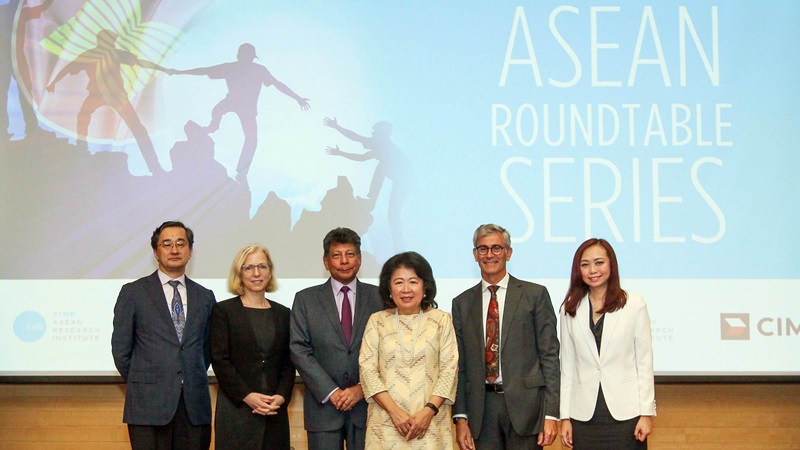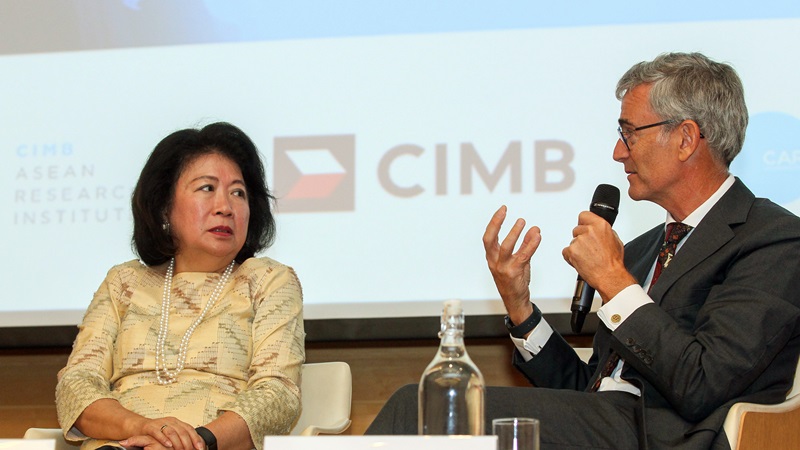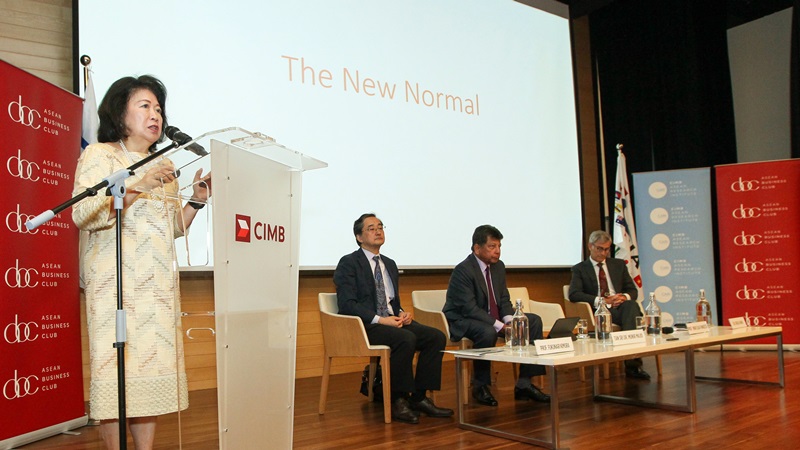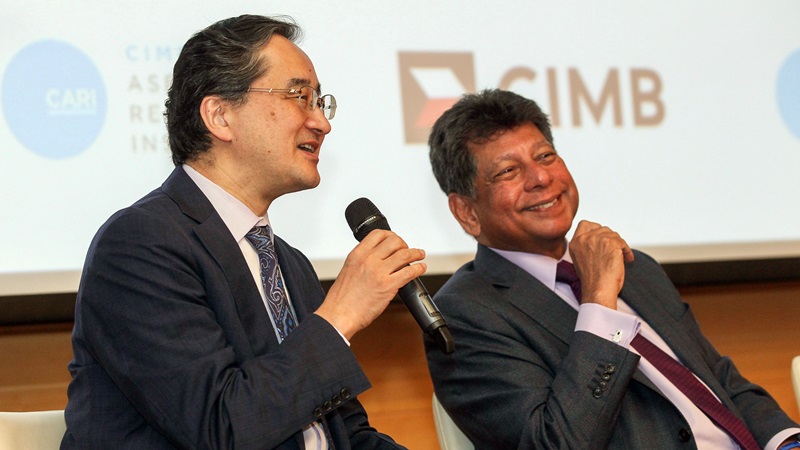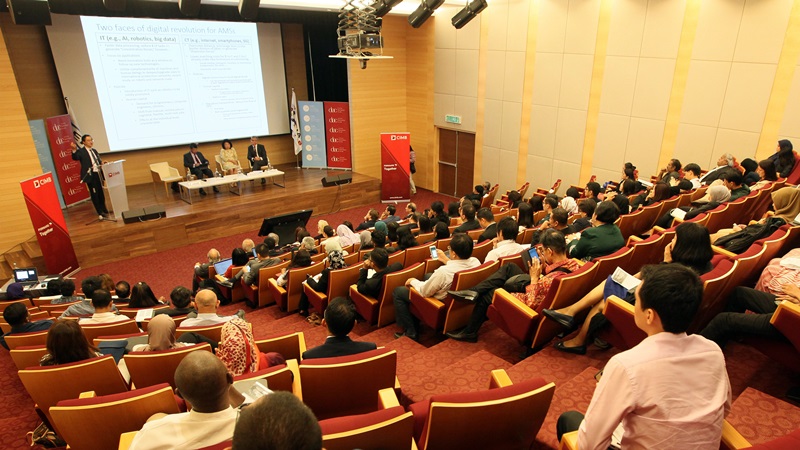ASEAN Must Chart New Vision Towards 2040
Share Article:
Print Article:
Kuala Lumpur, 26 July 2019: Experts caution ASEAN must make the political commitment to address major external issues confronting ASEAN to ensure ASEAN centrality is not compromised. To achieve that, ASEAN requires enhanced policy capacity, policy coordination and steady institutional change internally; while also requiring coherent ASEAN strategies and engaging regional and global partners in collective leadership.
This heed to caution was made during an ASEAN Roundtable Series organised by CIMB ASEAN Research Institute (CARI) in conjunction with the launch of the ASEAN Vision 2040 report published by the Economic Research Institute for ASEAN and East Asia (ERIA).
Tan Sri Dr Munir Majid, Chairman of CARI, observed in his opening remarks that ASEAN cannot continue to keep alluding to past successes, including economic growth to becoming - if it was one economy - the fifth largest economy in the world, and not give enough attention to the huge challenges facing the region today. ASEAN must feel the earth move under its feet, adjust to it and, most importantly, organize itself to play an effective role in shaping desirable outcomes.
'ASEAN currently finds itself in a changing geoeconomic, geopolitical, and technological landscape since the ASEAN Vision 2020 and the ASEAN Community Vision 2025 were first adopted, and it is of paramount importance to recalibrate a new vision to achieve the goals of a rules-based, people-centred, and sustainable ASEAN,' said Tan Sri Dr. Munir Majid.
The panellists at the roundtable emphasised that ASEAN must take proactive steps in pushing for global multilateralism as an alternative to waning US hegemony, and that ASEAN must deepen dialogue and cooperation with fellow middle powers including Japan, India, and Australia in order to navigate the current great power rivalry. They warned that ASEAN’s traditional policy of non-interference will impede the bloc’s development as a regional leader, while competing interests between the Member States results in a lack of a cohesive voice in global affairs.
Director of Communications at ERIA, Lydia Ruddy who presented on the ASEAN Vision 2040 report findings said that the vision is one in which ASEAN steps boldly forward towards the year 2040 to transform the ASEAN Community and secure its position in the region and globally.
'The ASEAN Community will need to be pro-active with a common diplomatic posture underpinned by the principle of collective leadership; adaptive and innovative, embracing the digital transformation and Fourth Industrial Revolution (4IR); resilient and sustainable, adopting new technologies and best-practices; integrated and connected, underpinned by good regulatory practice and governance; inclusive, focused on people empowerment and inclusion; and harnessing new networks for people engagement to build a deep sense of identity. All of this must be supported by a strong and effective ASEAN institutional ecosystem,' explained Lydia.
Prof Mari Pangestu, former Minister of Trade for Indonesia and currently Professor of International Economics at the University of Indonesia, discussed how the 4IR presents new challenges for ASEAN integration. She opines that as e-commerce and the digital economy increasingly subsume every aspect of commercial and societal transactions, the challenges to ASEAN integration now includes the challenge of creating a digital market. As the trade in traditional goods and services moves online, existing intra-ASEAN commitments (as well as ASEAN free trade agreements) are rolled back unless they are supported by commitments to keep the digital economy open.
'Data flows and online payments are the ‘glue’ that integrates all the other freedoms. Digitisation needs freedom of data flows that allow for seamless communications without regulatory frictions, and thereby create new and innovative services which may occasionally make existing regulatory systems obsolete. Rather than resisting such changes, the path forward means managing tensions within numerous policy disciplines – security, privacy, disruption, competition, taxation, and regulatory agency capacity. Interoperability and standards of technologies and regulations within a country and between countries are essential,' said Prof. Mari.
Prof Fukunari Kimura, Chief Economist of ERIA, believes ASEAN should be proactive to utilise both information technology (IT) including artificial intelligence (AI) and robotics and communication technology (CT) such as the internet and smartphones to further activate existing industries and create new businesses.
He observed that the aggressive utilisation of CT has already started. Costs of getting access to information, making communication, and utilising opportunities of matching have drastically reduced, and he observed the rise of various new businesses including social media, e-commerce, matching in transportation and lodging businesses, e-payments, and fintech. Benefits of internet users must be emphasised for both economic efficiency and inclusiveness. The policy environment must be developed for the free flow of data with proper backups to address economic and social concerns.
'ASEAN, particularly Malaysia and Thailand, has aggressively participated in international production networks of machinery industries. There is a preliminary finding in our empirical study suggesting that seeking complementarity between robotics and local resources may be the key for keeping production blocks in ASEAN. We must avoid massive 'reshoring,' which means that production blocks located in newly developed economies would go back to developed countries,' explained Professor Fukunari.
Dr Donald Hanna, Chief Economist of CIMB Group, added that ASEAN’s new vision requires the deepening of financial integration. Hanna believes the challenge for ASEAN will be to develop an efficient and stable financial system to facilitate growth while also deepening financial integration.
'An efficient and stable financial system is a central enabling condition for the investment needs to be mobilised for the ASEAN economic transformation, innovation and productivity growth into 2040. One way to strengthen the financial system would be to make financial firms more autonomous by liberalising the sector to foreign equity and competition. Reducing government ownership of financial institutions (with its implicit guarantee on deposits) would also encourage accountability in the system,' said Dr. Hanna.
He also added that the adoption of fintech will help improve the accessibility of financial services to consumers while being supervised by regulations focusing on ‘activities’ rather than ‘institutions’ to take into account new services.
Source: CARI ASEAN Press Release
